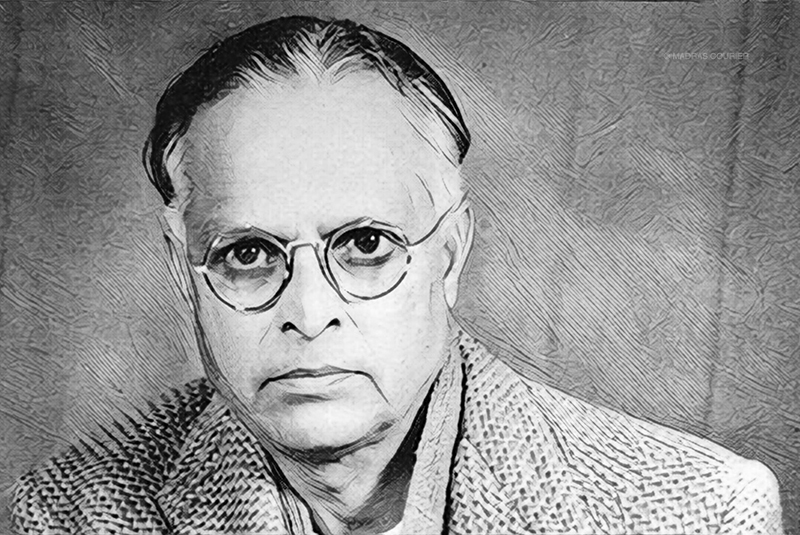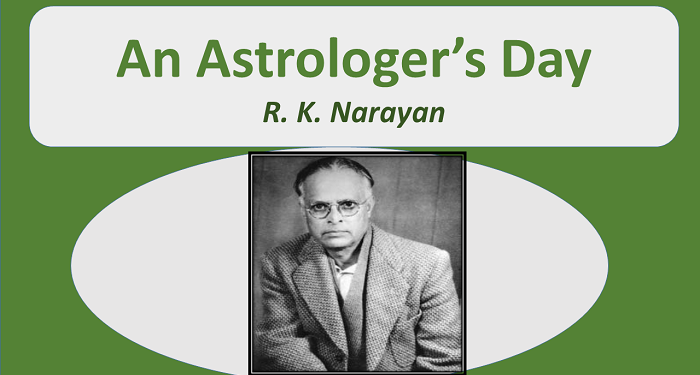Attempt a character sketch of the Astrologer
R.K. Narayan, one of India’s most celebrated authors, often created memorable characters that linger in the minds of readers long after they’ve finished his stories. In the intriguing short story “The Astrologer’s Day,” which is part of his book “An Astrologer’s Day and Other Stories,” Narayan presents us to the Astrologer, a complex figure who provokes a mixture of pity and rage.

The Astrologer, the central character of the story, is a man who earns his living by telling people their fortunes. His profession may be seen as mystic and enigmatic, but as we delve deeper into his character, we discover a myriad of human qualities that both endear and frustrate the reader.
The Astrologer’s Appearance:
The Astrologer is described as an ordinary man in his forties, dressed in a simple, worn-out coat and hat. His attire is shabby, and he carries an ancient leather briefcase containing his astrological paraphernalia – charts, papers, and books. He sports a beard that is unkempt and a pair of sharp, inquisitive eyes. His physical appearance does not command attention, but his aura is intriguing.
Also Read-
Central theme of poem My Grandmother’s House by Kamala Das
Narrative techniques in Gajar Halwa
Ruskin Bond’s Art of story Telling
The Mysterious Profession:
The Astrologer’s profession is mysterious and intriguing, particularly in a society where the belief in astrology and fortune-telling is deeply ingrained. This aspect of his character draws sympathy from the reader, as he seems to be a victim of the socioeconomic circumstances that have led him to this occupation. In a country like India, where many people turn to astrology for guidance and solace, the Astrologer’s services are in demand. However, this profession is often seen as exploitative, and the Astrologer’s role in this system can elicit anger from the reader.
Sympathy Evoked by the Astrologer:
- Struggle for Survival: The Astrologer’s journey to his current profession is shrouded in mystery. He gives no insight into his past and provides no clues to his background. Yet, his shabby appearance and the mention of a difficult life evoke sympathy. Readers wonder about the circumstances that led him to this occupation. It’s easy to feel for someone who seems to be struggling to make ends meet, especially in a society where financial stability is a challenge for many.
- The Human Desire for Hope: The Astrologer’s clients, who come to him seeking answers to their problems, reveal the innate human desire for hope and the belief that fate can be influenced. Despite the dubious nature of his profession, the Astrologer provides a glimmer of hope to people who are facing difficulties and uncertainties. This instills sympathy in the reader, as we understand the need for hope in the face of adversity.
- The Paradox of Knowledge and Ignorance: The Astrologer claims to possess knowledge of the future and the ability to predict events. This knowledge is both intriguing and comforting to his clients. However, it also highlights the paradox of his character. On one hand, he seems to hold the key to their destinies, while on the other, he himself is unaware of his past. This contradiction evokes sympathy as we witness the limitations of his knowledge and the mysteries of his own life.
- The Loneliness of the Astrologer: The Astrologer’s loneliness is palpable. He is described as a man who doesn’t have any friends or family. He leads a solitary existence, and the reader can’t help but feel a sense of isolation and desolation that emanates from him. This loneliness generates sympathy, as we wonder about the reasons behind his solitary life.
Anger Evoked by the Astrologer:
- Exploitation and Deception: The Astrologer’s profession is built on the exploitation of people’s vulnerabilities and their belief in the supernatural. He deceives his clients by offering vague predictions and conveniently leaving out the fact that he doesn’t have genuine supernatural powers. This exploitation of people’s faith and trust can incite anger in the reader. The Astrologer is seen as a con artist, preying on the gullibility of his clients.
- Lack of Transparency: The Astrologer operates in a world of secrecy and deceit. He never reveals the truth about his past or the methods he uses to make his predictions. This lack of transparency and honesty can frustrate the reader. It’s infuriating to see someone profiting from the ignorance of others without any regard for ethical boundaries.
- Moral Ambiguity: The story hints at the Astrologer’s involvement in a violent incident from his past. This moral ambiguity surrounding his character raises questions about his past actions and whether he has truly changed. It leaves the reader in a state of moral conflict, as we are uncertain about the extent of his guilt or innocence.
- The Cruel Prank: Towards the end of the story, the Astrologer plays a cruel prank on Guru Nayak, a man he believes is out for revenge against him. He capitalizes on Guru Nayak’s fear by pretending to predict his imminent death, only to reveal it as a ruse later. This heartless deception infuriates the reader, as it demonstrates the Astrologer’s willingness to manipulate and emotionally exploit others for his own safety.
Conclusion
The deft character development of Narayan questions our understanding of good versus evil, morality, and the complexity of human nature. The Astrologer’s persona functions as a mirror, reflecting the intricacy of human existence and the fuzziness of distinctions between compassion and contempt, honesty and dishonesty.
As we contemplate the Astrologer’s enigmatic personality, we are left with a lingering sense of unease and introspection. He remains a character that continues to captivate and provoke our emotions, making “The Astrologer’s Day” a timeless exploration of the human condition. Through this character, Narayan invites us to reflect on the enigma of existence, the pursuit of hope, and the moral dilemmas that shape our lives.
FAQ.
Q. Who is the Astrologer in “The Astrologer’s Day”?
The Astrologer is the central character in R.K. Narayan’s short story “The Astrologer’s Day.” He is a man in his forties who earns a living by telling people their fortunes.
Q. How does the Astrologer’s physical appearance contribute to his character?
The Astrologer’s shabby attire and unkempt beard make him appear as an ordinary, unremarkable man. His appearance doesn’t command attention, but it adds to the mystery surrounding his character.
Q. Why does the Astrologer’s profession evoke sympathy?
The Astrologer’s profession, though mysterious, is rooted in a society where belief in astrology and fortune-telling is deeply ingrained. He appears to be a victim of socioeconomic circumstances, struggling to make ends meet. This evokes sympathy for his plight.
Q. How does the Astrologer provide hope to his clients?
Despite the dubious nature of his profession, the Astrologer gives people hope by offering predictions and guidance. He capitalizes on the innate human desire for hope and the belief that fate can be influenced.
Q. What generates anger regarding the Astrologer’s character?
The Astrologer’s character can provoke anger due to his exploitation of people’s vulnerabilities and faith. He deceives clients by offering vague predictions while withholding the fact that he lacks genuine supernatural powers, making him appear as a con artist.
Q. What is the reader’s reaction to the Astrologer’s lack of transparency?
The Astrologer’s lack of transparency and honesty about his past and methods can frustrate the reader. It’s infuriating to see someone profit from the ignorance of others without ethical boundaries.













